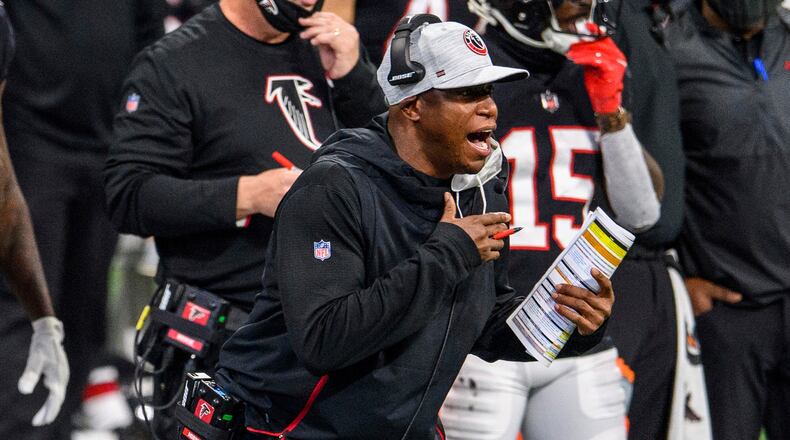Raheem Morris hasn’t done badly. The Falcons were 0-5 when they sacked Dan Quinn; they’re 4-6 since. Under their interim coach, they’ve lost only once by more than five points. Their past four losses have come by a total of 15 points. Morris suggested after the latest near-miss that the team is “close” to being good, and there are moments when even their greatest skeptic — i.e., me — wouldn’t rise to object.
But those are only moments. There’s a bigger picture to be viewed. The Falcons went from Jan. 13, 2008, to Oct. 11, 2020, under the same general manager. They’ve had the same quarterback since Sept. 7, 2008. Quinn had been in place since 2015. Over the past eight seasons — the first two being the final days of Mike Smith — they’re 57-70. They’ve finished above .500 twice.
Morris has been employed, albeit in several manifestations, by this club since Jan. 26, 2015. He’s liked and respected in Flowery Branch, and we’ve seen, albeit in flashes, that he mightn’t be a bad choice as head coach on a permanent basis — for some team. Just not this one.
As interim HC, Morris hasn’t done anything to disqualify himself as a candidate for continuing employment. It wasn’t his fault Todd Gurley fell into the end zone against the Lions, nor was it his fault than Younghoe Koo finally missed a kick. But here we need to do the pragmatic thing, meaning count. The Falcons started the season by losing five games under Quinn; if they lose Sunday at Tampa Bay, they’ll have finished with five consecutive losses under Morris.
Credit: AJC
He has been better than DQ, yes, but that’s not saying much. As an NFL head coach, Morris is 21-37. If he weren’t already employed by the Falcons, would he get more than a cursory look from Arthur Blank/Rich McKay going forward? Probably not. Has he won any single game with this team that suggests he’s the next Belichick? No. Of the Falcons’ four victories under Morris, none came against an opponent that will finish above .500.
The Falcons unfurled the we-can-play-with-anybody banner after their narrow loss in Kansas City, but let’s resist the urge to wave that. This is the NFL, the league of Any Given Sunday. The Jets, who seemed destined to go 0-16, have won twice and cost themselves Trevor Lawrence since the Falcons last won. Lest we forget, a last-gasp victory over the Super Bowl-bound 49ers bought Quinn, if not another full year, then another offseason and five more games.
Sticking with Quinn seemed a mistake from the moment it was announced. Koo’s miss in K.C. might have been the biggest favor ever done for this forlorn franchise. It meant Morris would have no 49ers-like victory. It meant the Falcons could well have a top-five draft pick, something they haven’t exercised since choosing Matt Ryan of Boston College. It meant Morris’ 11-game interim stint will finish sub-.500.
I’ve used this example before; here it is again. The 1978 Cincinnati Bengals started their season with Bill Johnson, whom everyone called Tiger, as head coach. Tiger’s team started 0-5, at which point he either resigned or was fired by franchise patriarch Paul Brown, who’d picked Johnson as his successor over (gulp) Bill Walsh. Up stepped offensive coordinator Homer Rice.
The Bengals went 4-7 under Rice, beating the playoff-bound Falcons of Leeman Bennett by 30 points and finishing with a 32-point victory over hated Cleveland. A giddy Brown — he was seldom described as such — removed the “interim” from Rice’s title. The Bengals, who finished 4-12 under Johnson/Rice, went 4-12 under Rice alone. He was head coach no longer, although he landed on his feet. He became athletic director at Georgia Tech.
Interim coaches almost always look better by immediate comparison. Interim coaches almost always inspire a debt of gratitude on the part of the owner who gave them the chance to run a team. Gratitude, however, should have its limits. Just because Morris got more from these Falcons than Quinn doesn’t make Morris a long-term answer. The belief here is that the Falcons, who loaded up on free-agent veterans for a last go-round with DQ, must learn to paint in broader strokes.
The absence of Thomas Dimitroff as GM affords the Falcons a chance to start over. That doesn’t mean they should dump Ryan — his contract renders him un-dump-able — and hand Zach Wilson of BYU the keys to the brick building at 4400 Falcon Parkway. It does mean that the Falcons, who began this season with the NFL’s oldest roster, need to stop deluding themselves.
They’re not “close.” They’ve had one surpassing season in the past eight, and the exception ended with the worst flop in the history of football. Morris has been here six years. He’s a different voice, but he’s not a new one. By firing Quinn and Dimitroff in October, the Falcons bought themselves a blank slate, football-operations-wise. They need to take advantage. They need true new voice and a succession plan for life beyond Ryan.
To bring back Morris would be to repeat the error made 12 months ago. By starting 1-7 last season, Quinn essentially became his own interim coach. The 6-2 finish fooled Blank into seeing something that wasn’t there. Things should be clearer now. Throwing a scare into the mighty Chiefs made for a surprising Sunday, but that’s all it did. Time to give Eric Bieniemy and Brian Daboll a Zoom call. Time to sound out Lincoln Riley, maybe even Urban Meyer. Time to try something different.
About the Author
The Latest
Featured



